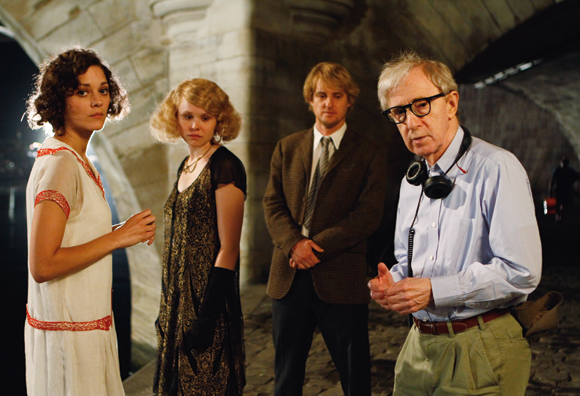There are two ways we could start this feature. We could talk about Woody Allen’s new film, Midnight in Paris, one of his finest and most delightful offerings in a while which opened the Cannes Film Festival this year. Or we could talk about Woody’s heroines. Heads it’s the movie. Tails it’s the women. Et voilà! Tails it is.
After all, Woody’s heroines are what they are by choice, not by chance. “Every now and then I find an actress with the kind of gift that inspires me to create parts for her.”, Allen explains his third collaboration with Scarlett Johansson in Vicky, Cristina, Barcelona (2008). “She’s very smart, sexy, gifted. And she’s lightning fast with her humor.” Despite her personal charms, Johansson’s title character Cristina, an American student holidaying in Spain and open to all sensual experiences – particularly those involving a wealthy bohemian lothario (an expertly seducing Javier Bardem) – is arguably a continuation of her most successful roles, the lost soul of Lost in Translation, a character who allowed the star a certain ambiguity not always present in either her sexpot parts or those that saw her cast against type (A Good Woman, The Boleyn Girl). What’s more, it puts Johansson in the hallowed company of female Woody regulars including but not limited to Diane Keaton, Mariel Hemingway, Dianne Wiest and Judy Davis, alongside enthusiastic one-off appearances by Julia Roberts, Drew Barrymore, Natalie Portman, Demi Moore, Naomi Watts and, most recently, Rachel McAdams opposite Marion Cotillard and France’s First Lady Carla Bruni in Midnight in Paris (we’ll come to that later).
Yet, since the 1992 disclosure of his romance with ex-girlfriend Farrow’s adopted daughter Soon-Yi Previn, 35 years his junior, Woody Allen has been mocked for his films’ depictions of women young enough to be his daughters, or even granddaughters. And there is no denying that Scarlett Johansson radiates many things, but maturity is not among them, so Allen’s decision to cast her in three films was ought to prompt collective sniggers in gossip columns. First there was Match Point (2005), in which her unstable but alluring Nola provides not just a sexual frisson but also fragility and grace. We’ll pass over Scoop (2006), their ill-judged comedy which notably failed to secure a release in the UK even though it was set in London, but it was the aforementioned Vicky Cristina Barcelona, which also co-stars Rebecca Hall and Penélope Cruz, that added fuel to the fire. His follow up, Whatever Works, in which Evan Rachel Wood (21) and Larry David (61) play an odd couple who, in a senior moment, gets married to live everything but happily ever after did one last thing.
But just to get the record straight: There is of course, the danger of confusing Allen with his characters. By that we mean those middle aged men who attach themselves to younger women in Allen’s films and who may pay for the urges of their mid-life crisis but the details of their behaviour are often neglected as some critics focus merely on the age disparity. However, one could argue that if there is an explicitly tasteless aspect to Allen’s unequal pairings, it is the tendency of the men to condescend to or even sneer at their girlfriend’s intellectual or cultural callowness, as in the case of Allen’s Isaac in Manhattan (1979) or Sydney Pollack’s Jack in Husbands and Wives (1992). In fact, the great paradox of Manhattan is that Isaac’s dumping of assured 17-year-old high-school girl Tracy (Mariel Hemingway) for a woman of his own age (Diane Keaton) who is as neurotic as he is, costs him his chance of happiness.
By contrast, let’s take a look at Hannah and Her Sisters (1986), one of those films where Allen the actor is only working in the shadow of a wonderful cast, featuring an underrated Farrow, who was then an Allen regular as well as his off-screen partner. The film is a deftly scripted depiction of the life, love and marriage of the three daughters of a family (Mia Farrow, Diane Wiest, Barbara Hershey) and Allen’s assured directing style allows his heroines to flourish. Beyond that, Farrow brings genuine mystery to a nurturing figure who may not be as saintly as she seems.
According to Allen, Hannah was a character neither Farrow nor him understood, at the start, and at the finish: “We could never figure out whether Hannah was the bulwark of the family and the spine who held everyone together, or whether Hannah was not so nice … Mia looked to me for guidance and I could never give it to her.”
Although Allen seems just as out of synch today as he was in the 1970s and early 1980s, he clearly is no longer as central to cinematic culture as he was back then. Yet, the films themselves remain full of confidence and vitality – partly, owing to his declared refusal to change combined with a carefree optimism that so far lasted 45 years of his unpredictable career: “I’m forever pessimistic about everything except work”, he admitted not too long ago when questioned about You Will Meet a Tall Dark Stranger, an ensemble drama, not without its moments of comedy, starring Naomi Watts in the role of a gallery assistant stuck in a failing marriage with washed-up American writer Roy (Josh Brolin). “I feel that my best work is still to come, and I keep trying. It may be foolish and misplaced optimism, but nevertheless I’m optimistic.” And perhaps it is this unmistakable blend of a passionate urge, nerdy ignorance and bittersweet otherworldliness which informs his artistic persona paired with a sharp repartee and smart wit that makes Hollywood’s finest actresses of all ages fall for the 75-year-old director who still makes a film more or less every twelve months as he has done since his debut What’s Up, Tiger Lily? in 1966. And trust Allen, in the late afternoon of his career, to confound us with yet another stunning comeback (as only recently projected with Matchpoint and Vicky, Christina, Barcelona) following a decade of too many misfires.
Perhaps now is a good moment to ask what on earth happened to Allen in the mid-1990s. Between the excellent Annie Hall (1977) and gangster comedy Bullets over Broadway (1994) he completed a run of 17 films and one segment (‘Oedipus Wrecks’ in 1989’s portmanteau film New York Stories) that is unique in American cinema for its inventiveness, consistency, its wit and philosophical breath. However, the quirky Alice (1990) and the lackluster 1993 caper Manhattan Murder Mystery both indicated that Allen wasn’t beyond the kind of anecdotalism and inconsequentiality that moved centre stage with Mighty Aphrodite (1995), Everyone Says I Love You (1996), Small Time Crooks (2000), The Curse of the Jade Scorpion (2001), Hollywood Ending (2002) and Anything Else (2003). Each of these films has its merit, but none of them shows the old mastery. And while the public could not get enough of the off-screen drama, Allen’s audiences largely abandoned him. However, A-list stars and starlets remained faithful to him, no matter how mediocre the films. After years of slowly dying on the vine under the beating glare of annoyed film critics and frustrated fans, Allen managed to redeemed himself with Match Point, leaving New York behind for the first time in his film career to shoot in London, and continuing his recent European sojourn from there onto Barcelona.
And now, hot on the heels of Johansson, Cruz, Hall and their bizarre Spanish love square liaison come Rachel McAdams and Marion Cotillard to star opposite Owen Wilson in Midnight in Paris. It has to be said that Wilson does his very best Woody Allen impression as a wanna-be-novelist Hollywood screenwriter who is visiting Paris with his demanding fiancée Inez (McAdams) and her wealthy parents (Kurt Fuller and Mimi Kennedy). One night, as he strolls through the city on his own while Inez shakes a leg with an obnoxious old friend of hers (Michael Sheen), Gil gets invited to jump into a vintage car which brings him right back to life in Paris in the 1920s. He meets Ernest Hemingway, Scott and Zelda Fitzgerald, Gertrude Stein, Picasso, Dalí, Buñuel, Man Ray and a beautiful woman called Adriana (Cotillard), with whom, obviously, he falls in love. Cotillard looks terrific in her 1920s outfits and yet she is doing little more than acting the romantic muse. But, it is McAdams who really steals the show here as she radiates exactly that kind of sophisticated sex-appeal that could inspire Woody Allen to new trifles of charming perfection in the near future.
Of course, that would be down to his instincts. Besides, what got us all the more excited was the fact that, on the set of Vicky, Christina Barcelona, Allen seems to have closed bonds with another one of his new favourite actresses, one who we would also be delighted to welcome back as part of Allen’s ensemble in the future: “I got Woody’s glasses as a present,” Cruz revealed recently in an interview with “Empire”: “It’s my treasure. I love those glasses. He only has two pairs and he gave me one.” Well, we shall see what comes out of that.
Midnight in Paris
Spain/USA 2011 – Written and directed by Woody Allen
Cinematography: Darius Khondji; Editing: Alisa Lepselter
Production Design: Anne Seibel; Costume Design: Sonia Grande
Starring: Owen Wilson, Rachel McAdams, Kurt Fuller, Mimi Kennedy, Michael Sheen, Carla Bruni
Distributor: Filmladen


